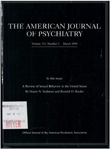AIDS/HIV risk behavior among the chronic mentally ill
Abstract
OBJECTIVE: There is growing concern that chronic mentally ill adults living in the community have a high risk for HIV infection. The purpose of this study was to identify risk knowledge, high-risk behaviors, and risk-related encounters of chronic psychiatric outpatients. METHOD: Detailed information on high-risk behaviors and risk-related situations during the past 12 months was collected from 60 outpatients appearing for regular visits at inner-city community mental health clinics. RESULTS: Of the 60 outpatients, 37 (62%) had been sexually active during the past year, and 42% of the men and 19% of the women reported multiple sexual contacts and infrequent use of condoms during intercourse. Assessments of the patients' knowledge of AIDS risks revealed substantial deficits in their practical understanding of AIDS and risk reduction measures. Although use of intravenous drugs was uncommon in this group, many subjects reported histories of 1) trading sex for money, drugs, or a place to stay, 2) coercion to engage in unwanted sex, 3) causal sexual encounters, and 4) sexual activity after use of drugs or intoxicants. Twenty percent of the subjects had met their sexual partners on the streets, in parks, or in other public places. One-third had been treated for sexually transmitted diseases other than AIDS. CONCLUSIONS: These findings underscore the need for AIDS risk assessment, counseling, and prevention programs for the chronic mentally ill.
Access content
To read the fulltext, please use one of the options below to sign in or purchase access.- Personal login
- Institutional Login
- Sign in via OpenAthens
- Register for access
-
Please login/register if you wish to pair your device and check access availability.
Not a subscriber?
PsychiatryOnline subscription options offer access to the DSM-5 library, books, journals, CME, and patient resources. This all-in-one virtual library provides psychiatrists and mental health professionals with key resources for diagnosis, treatment, research, and professional development.
Need more help? PsychiatryOnline Customer Service may be reached by emailing [email protected] or by calling 800-368-5777 (in the U.S.) or 703-907-7322 (outside the U.S.).



